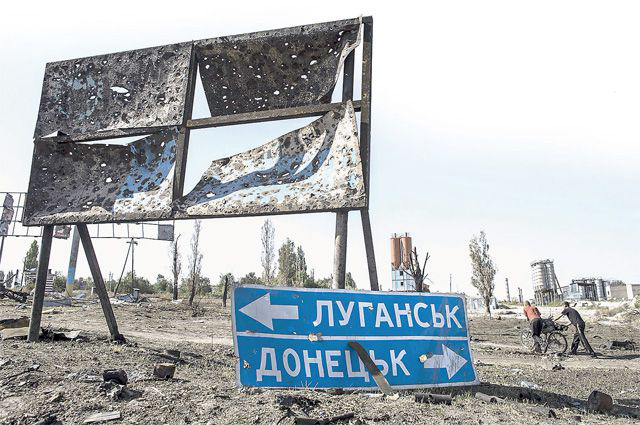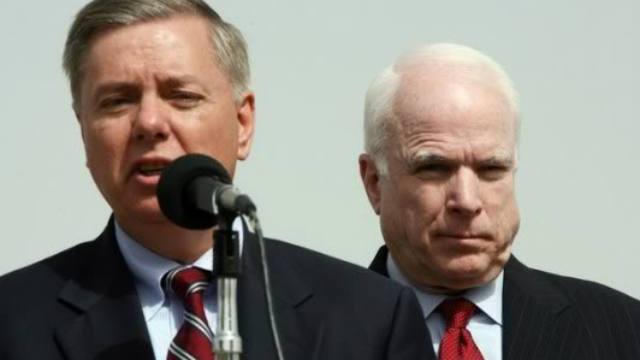The Karel Čapek novel War with the Newts was written two years before Munich. And it describes in detail how western powers step by step hand over Europe to Hitler and where this leads. People even understood all of this then. If not all people, then many.
Today, not only many people know all of this, but all people. The world freezes in anticipation: will Munich be repeated? Everyone understands that recognising a new line of demarcation is a New Munich. For this would mean that after a couple of months the line will move again and it will once again have to be recognised. Everybody understands that fixing the line of demarcation with international peacekeepers is also a New Munich. Because this is a consolidation of power by Russian agents over part of the Donbas. Authority produced by fraud and force, held in place by terror and backed by Russian troops and weaponry. In fact, it is an attempt to transfer to the peacekeepers the function currently performed by the Russian invaders in the Donbas.
In fact, this is the forced separation by Russia of another Ukrainian territory following the Crimea. This means that the Russian Federation may attempt to organise other hybrid forces in its neighbours. And the result of this is that soon this can be attempted by any country with enough arrogance and contempt for human life.
Perhaps Hollande and Merkel know a magic formula by which they can get the Great Newt to withdraw from the Donbas, with his position being safely covered by international peacekeepers? Why did they rush to the Kremlin amphibian? What made them hurry so?
The latter point is more or less clear. They were alarmed at the prospect of American arms being supplied to Ukraine. As the head of European diplomacy, Federica Mogherini, put it: "When trying to find a diplomatic solution, as we are trying to do with all our strength, supplying arms to one of the sides in the conflict seems to me an inconsistent gesture." All painfully familiar. European democracies allowed Hitler and Mussolini to strangle the Spanish Republic by denying the supply of weaponry "to one of the sides in the conflict". Of course in order "not to add fuel to the fire of civil war." This was termed the "policy of non-intervention". How many European communists (and not only communists) issued incriminating tirades against this policy? The bad joke of the story is that the role of the non-intervenor is filled today by a prominent figure, that of the former member of the Italian Communist Party, Federica Mogherini.
European leaders fear that the supply of weapons to Ukraine will provoke the Kremlin into an escalation. They are scared that the Supreme Newt will go even further. But where can he go on to?
He does not have the strength to occupy the whole of Ukraine. Any move beyond the limits of the Donbas is extremely risky for him, because the population there will not meet his armies in the same way as the people of "Luganda" (derogatory term for the "Luhansk People's Republic"- ed.). The only thing the Kremlin can now do is to formally announce the introduction of troops into the Donbas and stop playing hybrid war. This will not fundamentally change the situation in the Donbas. But it will oblige European leaders to burn their last bridges with the Kremlin, and introduce the type of sanctions that will cost Europe a pretty penny. And this they really don't want. That is what they are scared of.
Hollande and Merkel flew to Moscow to scare Putin: do not compromise on anything at all and arms supplies to Ukraine will become inevitable. But it is hard for people to scare Putin who are themselves more scared of the consequences than he is. People who continue to insist that they do not want to build European security against Russia, but together with her. People who are scared to say that we will not build security with this Russia, with Putin's Russia.
In such a situation, any talk of concessions from Putin will inevitably turn into talk of concessions to Putin. When defending a situation of uncertainty and reticence, a policy of brinkmanship on the edge of a New Munich will sooner or later turn into a New Munich.
One can argue, as does the President of France, that it will be difficult for the pre-war population of the Donbas to return to their former life, and they will therefore need autonomy. But any elections, referendums and autonomy will only be possible once the Luganda rebels have given up power and arms. One can discuss who they should give up power and arms to. Perhaps to a temporary international administration. Perhaps to international peacekeepers. But only to real ones, not fake ones like those who slept soundly while Ratko Mladić was slaughtering the population of Srebrenica. An international peacekeeping operation in the Donbas will only be meaningful if the peacekeeping force has the right and physical capability to use physical force to disarm those who do not obey it. Not only along the ghostly demarcation line, but throughout Luganda. Any new bold initiatives or "peace plans" without the rebels giving up power and weapons will be a New Munich.
In fact, there is a way to make Putin fear the consequences of escalation more than they do. And at the same time not only to do without arms deliveries to Ukraine, but ruinous economic sanctions which lead to suffering of people guilty of nothing at all both in the West and in Russia. To do this they need to convince Putin of their willingness to answer the escalation with the deployment of their own forces in Ukraine, in order to carry out a peacekeeping operation to help those soldiers who accidentally strayed during military exercises to find the road back home.





